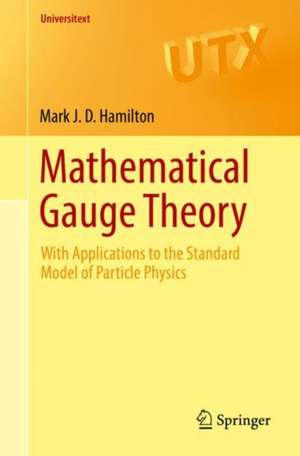Mathematical Gauge Theory: With Applications to the Standard Model of Particle Physics: Universitext
Autor Mark J.D. Hamiltonen Limba Engleză Paperback – 10 ian 2018
This carefully written textbook is aimed at graduate students of mathematics and physics. It contains numerous examples and more than 150 exercises, making it suitable for self-study and use alongside lecture courses. Only a basic knowledge of differentiable manifolds and special relativity is required, summarized in the appendix.
Din seria Universitext
- 13%
 Preț: 353.48 lei
Preț: 353.48 lei -
 Preț: 418.67 lei
Preț: 418.67 lei -
 Preț: 465.61 lei
Preț: 465.61 lei -
 Preț: 371.98 lei
Preț: 371.98 lei - 17%
 Preț: 394.41 lei
Preț: 394.41 lei -
 Preț: 356.77 lei
Preț: 356.77 lei - 17%
 Preț: 364.56 lei
Preț: 364.56 lei - 15%
 Preț: 543.75 lei
Preț: 543.75 lei - 15%
 Preț: 497.21 lei
Preț: 497.21 lei -
 Preț: 634.38 lei
Preț: 634.38 lei -
 Preț: 396.53 lei
Preț: 396.53 lei - 17%
 Preț: 427.68 lei
Preț: 427.68 lei - 13%
 Preț: 355.51 lei
Preț: 355.51 lei -
 Preț: 360.07 lei
Preț: 360.07 lei - 17%
 Preț: 365.34 lei
Preț: 365.34 lei -
 Preț: 358.44 lei
Preț: 358.44 lei - 15%
 Preț: 553.33 lei
Preț: 553.33 lei - 17%
 Preț: 364.81 lei
Preț: 364.81 lei -
 Preț: 673.45 lei
Preț: 673.45 lei - 15%
 Preț: 509.58 lei
Preț: 509.58 lei - 17%
 Preț: 427.32 lei
Preț: 427.32 lei - 17%
 Preț: 426.76 lei
Preț: 426.76 lei - 8%
 Preț: 495.43 lei
Preț: 495.43 lei - 20%
 Preț: 569.54 lei
Preț: 569.54 lei - 19%
 Preț: 429.21 lei
Preț: 429.21 lei - 17%
 Preț: 369.06 lei
Preț: 369.06 lei - 15%
 Preț: 737.46 lei
Preț: 737.46 lei - 13%
 Preț: 389.95 lei
Preț: 389.95 lei -
 Preț: 487.96 lei
Preț: 487.96 lei - 20%
 Preț: 628.22 lei
Preț: 628.22 lei -
 Preț: 372.86 lei
Preț: 372.86 lei -
 Preț: 319.07 lei
Preț: 319.07 lei -
 Preț: 379.86 lei
Preț: 379.86 lei -
 Preț: 445.88 lei
Preț: 445.88 lei -
 Preț: 382.36 lei
Preț: 382.36 lei - 15%
 Preț: 533.72 lei
Preț: 533.72 lei - 15%
 Preț: 496.02 lei
Preț: 496.02 lei - 15%
 Preț: 474.82 lei
Preț: 474.82 lei -
 Preț: 389.70 lei
Preț: 389.70 lei -
 Preț: 484.08 lei
Preț: 484.08 lei - 15%
 Preț: 469.41 lei
Preț: 469.41 lei - 15%
 Preț: 643.48 lei
Preț: 643.48 lei -
 Preț: 415.02 lei
Preț: 415.02 lei - 15%
 Preț: 602.25 lei
Preț: 602.25 lei - 20%
 Preț: 510.24 lei
Preț: 510.24 lei - 15%
 Preț: 588.37 lei
Preț: 588.37 lei -
 Preț: 381.59 lei
Preț: 381.59 lei -
 Preț: 489.87 lei
Preț: 489.87 lei -
 Preț: 493.89 lei
Preț: 493.89 lei
Preț: 602.42 lei
Preț vechi: 708.73 lei
-15% Nou
Puncte Express: 904
Preț estimativ în valută:
115.27€ • 120.35$ • 95.40£
115.27€ • 120.35$ • 95.40£
Carte tipărită la comandă
Livrare economică 05-19 aprilie
Preluare comenzi: 021 569.72.76
Specificații
ISBN-13: 9783319684383
ISBN-10: 3319684388
Pagini: 613
Ilustrații: XVIII, 658 p. 40 illus.
Dimensiuni: 155 x 235 x 38 mm
Greutate: 0.93 kg
Ediția:1st ed. 2017
Editura: Springer International Publishing
Colecția Springer
Seria Universitext
Locul publicării:Cham, Switzerland
ISBN-10: 3319684388
Pagini: 613
Ilustrații: XVIII, 658 p. 40 illus.
Dimensiuni: 155 x 235 x 38 mm
Greutate: 0.93 kg
Ediția:1st ed. 2017
Editura: Springer International Publishing
Colecția Springer
Seria Universitext
Locul publicării:Cham, Switzerland
Cuprins
Part I Mathematical foundations.- 1 Lie groups and Lie algebras: Basic concepts.- 2 Lie groups and Lie algebras: Representations and structure theory.- 3 Group actions.- 4 Fibre bundles.- 5 Connections and curvature.- 6 Spinors.- Part II The Standard Model of elementary particle physics.- 7 The classical Lagrangians of gauge theories.- 8 The Higgs mechanism and the Standard Model.- 9 Modern developments and topics beyond the Standard Model.- Part III Appendix.- A Background on differentiable manifolds.- B Background on special relativity and quantum field theory.- References.- Index.
Recenzii
“Assuming an introductory course on differential geometry and some basic knowledge of special relativity, both of which are summarized in the appendices, the book expounds the mathematical background behind the well-established standard model of modern particle and high energy physics… I believe that the book will be a standard textbook on the standard model for mathematics-oriented students.” (Hirokazu Nishimura, zbMATH 1390.81005)
Notă biografică
Mark Hamilton has worked as a lecturer and interim professor at the University of Stuttgart and the Ludwig-Maximilian University of Munich. His research focus lies on geometric topology and mathematical physics, in particular, the differential topology of 4-manifolds and Seiberg-Witten theory.
Textul de pe ultima copertă
The Standard Model is the foundation of modern particle and high energy physics. This book explains the mathematical background behind the Standard Model, translating ideas from physics into a mathematical language and vice versa.
The first part of the book covers the mathematical theory of Lie groups and Lie algebras, fibre bundles, connections, curvature and spinors. The second part then gives a detailed exposition of how these concepts are applied in physics, concerning topics such as the Lagrangians of gauge and matter fields, spontaneous symmetry breaking, the Higgs boson and mass generation of gauge bosons and fermions. The book also contains a chapter on advanced and modern topics in particle physics, such as neutrino masses, CP violation and Grand Unification.
This carefully written textbook is aimed at graduate students of mathematics and physics. It contains numerous examples and more than 150 exercises, making it suitable for self-study and use alongside lecturecourses. Only a basic knowledge of differentiable manifolds and special relativity is required, summarized in the appendix.
This carefully written textbook is aimed at graduate students of mathematics and physics. It contains numerous examples and more than 150 exercises, making it suitable for self-study and use alongside lecturecourses. Only a basic knowledge of differentiable manifolds and special relativity is required, summarized in the appendix.
Caracteristici
Explains the Standard Model to students of both mathematics and physics Covers both the specific gauge theory of the Standard Model and generalizations Highly accessible and self-contained
